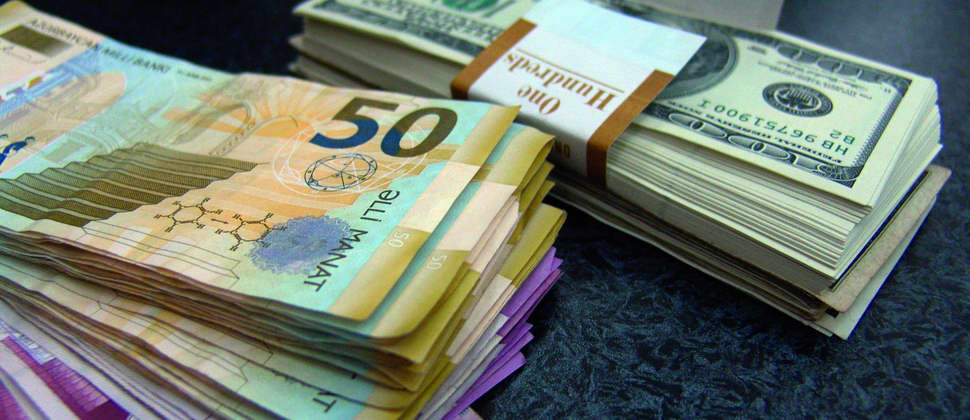Azerbaijan’s manat stands strong in face of storms

By Gulgiz Dadashova
Falling oil prices and the weakening of the Russian ruble along with the negative ratings assigned by international financial institutions had badly affected the economies of post-Soviet countries.
These countries have strong economic and political ties with Russia, and they felt the crisis threatening the Russian economy which was especially evident in the way their currencies reacted to the developments.
Belarus and Turkmenistan saw their currencies devalued over the last week and experts predict the process to continue in Kazakhstan. And in Armenia the situation is even worse as its national currency, the dram, was expected to follow suit.
Azerbaijan’s economy seems to be the most stable in the CIS and Eastern Europe regions with its strong national currency, the manat. The Central Bank has vowed to keep the manat stable even as the economic growth slowed due to slump in oil prices and production.
The Central Bank has announced that it spent $1.13 billion to support its national currency last December after a wave of ruble devaluation in Russia and slumping oil prices that forced devaluations in other former Soviet states.
The manat appreciated 0.1 percent against the dollar last month. The manat gained 0.1 percent to 0.7844 against the dollar on January 15.
"The crisis in Russia and neighboring countries that caused the devaluation of their currencies had a negative psychological effect on the Azerbaijani currency market in December," the Central Bank said in a statement. “But quick regulatory measures ensured stability.”
The CBA said the manat’s stability is the key to steadying the broader economy. It also promised to use “all means” at its disposal to keep the currency stable through 2015.
Azerbaijan, the biggest economy in the South Caucasus, relies on hydrocarbons for more than 90 percent of exports and 65 of the state budget formed on the petrodollars.
But, the low oil prices are not the number one problem of Azerbaijan, but it is for the other countries of the region. The country was able to keep the manat stable even during the 2008 global financial crisis.
The country’s economic model is quite unique and different with Russia's which is suffering from depreciation of the ruble and outflow of capital and foreign investors.
One of the reasons that saved the Azerbaijani manat is that the trade with Russia and other former Soviet republics declined in importance, although Russia is still the main trading partner of the Commonwealth of Independent States.
The Azerbaijani government has taken a number of measures to develop its own trade capacity and keeps the rising trend in trade with Europe.
Azerbaijan demonstrates a high-growth economy, which also got assured in the latest WB report. In the January edition of Global Economic Prospects, the Bank noted that Azerbaijan's GDP growth is expected to reach 4.4 percent in 2015 compared to the previous year which stood at 4.1 percent.
The report says that the WB expects growth of Azerbaijani economy by 4.1 percent in 2016 and at 3.8 percent in 2017.
Azerbaijan’s government says there would be no worry even if the oil prices fall to $40 a barrel as it relies mainly on the foreign exchange reserves hitting $54 billion on its macroeconomic stability.
Experts also are optimistic about the future of the Azerbaijani economy.
“This is one of the countries with the lowest debt per capita,” Florian Schroeder, the executive director and board member of the German-Azerbaijani Chamber of Commerce told Deutsche Welle. “There are reserves in the Oil Fund (SOFAZ), and the Central Bank. I interpret the figures that are available so that the country can, if we take the basis of current conditions at a price of $50 per barrel, survive for 10 years.”
“Of all the regional currencies, I would expect the Azerbaijani Central Bank to value FX stability,” Timothy Ash, the London-based chief economist for emerging markets at Standard Bank Group Ltd., told Bloomberg. “Remember they held the manat even through the Lehman crisis.”
Economist Nazim Mammadov, for his turn, said Azerbaijan, which is one of the largest producers of oil in the post-Soviet space, has a strong balance of payments compared to other countries in the region. Its economy is one of the fastest growing in the world over the past decade, he added.
"The only country, which did not allow the devaluation of its currency to the USD during the year, is Azerbaijan,” he said, adding that there are no objective economic fundamentals to reduce the rate of manat.
Mammadov sees no problem for Azerbaijan in the coming days due to lower oil prices on the world market, as even if oil prices fall to $40 per barrel, the volume of currency coming into the country will be more than exported.
--
Follow Gulgiz Dadashova on Twitter: @GulgizD
Follow us on Twitter @AzerNewsAz
Here we are to serve you with news right now. It does not cost much, but worth your attention.
Choose to support open, independent, quality journalism and subscribe on a monthly basis.
By subscribing to our online newspaper, you can have full digital access to all news, analysis, and much more.
You can also follow AzerNEWS on Twitter @AzerNewsAz or Facebook @AzerNewsNewspaper
Thank you!
